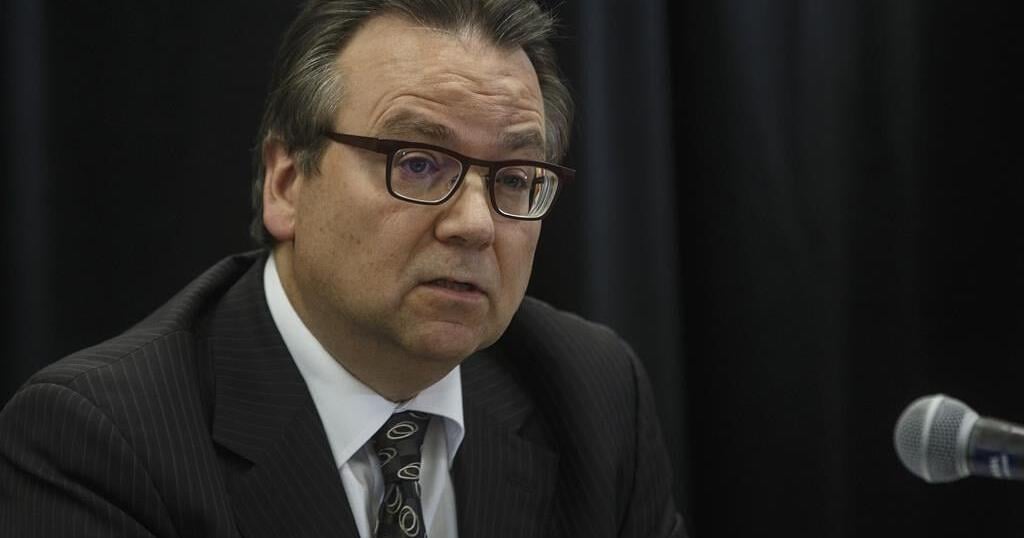EDMONTON – The provincial government’s management of Alberta’s increasingly stressed water resources is all wet, says the province’s auditor general.
A highly critical report from the auditor released Wednesday finds Alberta has implemented water conservation objectives in two of its seven major river basins. The government also doesn’t know if existing water conservation objectives are working.
The report says processes to monitor water use, assess risks and decide when conservation is needed are weak. And monitoring to ensure water users are being efficient and staying within the requirements of their licences aren’t up to the job.
“(Alberta Environment and Protected Areas) lacks effective processes to manage surface water allocations and use,” said auditor general Doug Wylie. “Public reporting on the outcomes of surface water management is lacking.”
Environment Minister Rebecca Schulz was not available to answer questions.
In an emailed statement, department spokesman Ryan Fournier said it takes Wylie’s conclusions seriously and is spending $18.5 million over three years on a review of the province’s water management and regulatory system.
Wylie’s report says the lack of conservation objectives covers both water quality and quantityconcerns.
“(It includes) impacts on aquatic life, impacts that various industrial, commercial and recreational activities would have,” said assistant auditor general Eric Leonty, who oversaw the audit.
There are no triggers that let managers know when water is running short. Little monitoring and enforcement is done to ensure current users are following their licences.
“What we found for the majority of those compliance assessments is that they weren’t completed,” said Leonty. “A number of staff didn’t even know that was a requirement.”
In many cases, Leonty said water licences were renewed even when there was evidence the rules weren’t being followed.
As well, the report says Alberta’s water management system is based on information that is years old.
“When it comes to something like the overall supply and demand levels, the last time that was (studied) was about 16 years ago,” Leonty said.
The report also concludes that Alberta is ill-equipped to react to changing water conditions. The province’s first-in-time, first-in-right system of management locks in historic use patterns and ensures licence holders get water whether they use it all or not.
“Historic water licences aren’t impacted by a water conservation objective,” said Leonty. “That does result in constraints, even when there is a conservation objective, to deal with that situation.
“The current approach is reactive rather than proactive.”
Fournier said the upcoming review will work with water users to improve conservation and productivity. And it will modernize information management systems to allow managers to react more quickly.
“Water conservation objectives are already in place where they are most effective, in areas with high water demand or where water shortages are more common,” he said.
Wylie added that public reporting should also improve.
While data from individual licences is available, information on basins and sub-basins is not. As well, the report says the government relies on self-reporting, which it describes as “clearly ineffective.”
Kennedy Halvorson, water specialist with the Alberta Wilderness Association, said the audit reflects concerns her group has had for years.
“The government is essentially making decisions without knowledge or regard for the minimum amount of water required to keep our watersheds viable,” she said. “They’re doing that without keeping records or sufficient regard to the public.”
The audit comes as Alberta continues to experience water worries.
Most of the province is considered either abnormally dry or under drought conditions from moderate to extreme. As of July 4, there were 23 water shortage advisories in the province.
Municipalities, irrigators and industry in southern Alberta have agreed to reduce their water use, although the agreements are not binding.
Climate scientists say the Prairies will experience lower summer stream flows, falling lake levels, retreating Rocky Mountain glaciers and drought.
Meanwhile, the province’s energy regulator is reviewing proposals for coal mining exploration, a thirsty industry.
“(Water) is life,” said Halvorson. “It’s precious.
“We need to know we’re using it in a way that’s supportable long term.”
This report by The Canadian Press was first published July 10, 2024.
